MIT SCHOOL OF HUMANITIES, ARTS, AND SOCIAL SCIENCES
Media Digest | April 2021
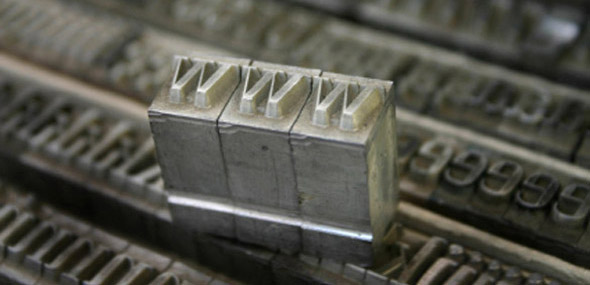
The Media Digest is a section of the Said and Done newsletter. Subscribe
Office of the Dean | 22 April | Earth Day 2021
Dear Friends,
As I write today, the nation has just witnessed an historic verdict on a case of excessive police force. It’s hard to overstate how important such accountability is for a healthy society: whatever our background, a fair and viable justice system must be one of the bedrocks of American democracy.
Efforts to tame the pandemic also show promising signs — including steps to diminish inequities in vaccine distribution and to share factual, reassuring information with people who are, for various reasons, resistant to vaccination. Here, at MIT we continue to follow the science and public health guidelines — and we press forward with work in many disciplines to help quell the pandemic.
And this month, as ever, MIT’s humanistic faculty continue their contributions to public discourse about today’s complex issues.
In a New York Times op-ed, health economist Amy Finkelstein describes the enormous benefit of expanding randomized trials to evaluate healthcare policy. An article in The Atlantic cites new research by economist and practicing physician Jeffrey Harris on how years of HIV vaccine research on mRNA and viral-vector technology prepared the way for the swift development of the Covid-19 vaccines.
For a Boston Globe article, Craig Steven Wilder, professor of history and author of Ebony & Ivy: Race, Slavery, and the Troubled History of America’s Universities, comments on the imperative for American universities to continue the moral reckoning with their histories of entanglement with slavery and the slave economy.
Continuing his research on the state of voting in the U.S. today, political scientist Charles Stewart III, head of the MIT Election Data and Science Lab, offers perspectives in The New York Times and Vox on election administration and on the current GOP effort to curtail mail-in voting. Stewart finds the effort curious since until the recent election, voting-by-mail was more embraced by Republicans.
As foreign policy is making headlines, MIT's national security experts provided insight for numerous media outlets: M. Taylor Fravel discussed the initial US/China talks under the Biden/Harris administration on NPR's All Things Considered; Vipin Narang talked with Reuters and others about North Korea’s ballistic missile launch; and Jim Walsh appeared on NPR’s Here & Now program with analysis of the revived Iran nuclear deal.
I hope you enjoy this month's research-based commentaries on the worlds of health, history, justice, national security, and the electoral infrastructure of democracy.
With warm wishes for Earth Day and the mid-Spring season,
Melissa
Melissa Nobles
Kenan Sahin Dean
Professor of Political Science
MIT School of Humanities, Arts, and Social Sciences
AWARDS & HONORS
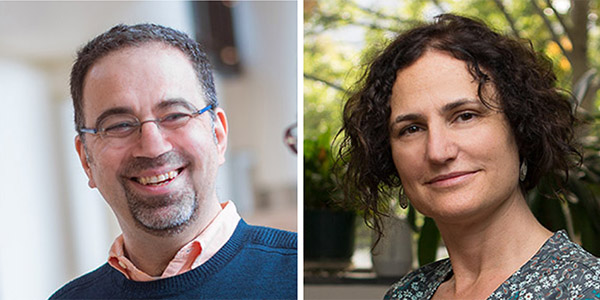
L to R: Institute Professor Daron Acemoglu; photo by Gretchen Ertl; Gigliola Staffilani, Professor of Mathematics; photo by Bryce Vickmark
ECONOMICS + MATHEMATICS
Committed to Caring Awards | Daron Acemoglu and Gigliola Staffilani
Institute Professor Daron Acemoglu, an economist — as well as Gigliola Staffilani, Professor of Mathematics — have received MIT's 2021 Committed to Caring awards. Student nominators say Acemoglu helps them learn to evaluate the strengths and weaknesses of their research, and that he demonstrates confidence that all students can “contribute meaningfully to the field.”
Story
ECONOMICS
MIT Graduate Program in Economics ranked No.1 in the nation for 2021
U.S. News ranked MIT’s economics PhD program No. 1 ranking overall; it also earned first- or second-place rankings for six economics specialties.
Story
LITERATURE
Joshua Bennett receives Whiting Award for Nonfiction and Poetry
Bennett, a 2015 Pre-Doc in MIT Literature, is the author of three books of poetry and literary criticism — The Sobbing School (Penguin, 2016), Owed (Penguin, 2020), and Being Property Once Myself (Harvard University Press, 2020). Bennett also received a Guggenheim Fellowship this month in American literature.
Story
KNIGHT SCIENCE JOURNALISM AT MIT
“Timber Wars” from Oregon Public Broadcasting wins McElheny Award
Knight Science Journalism Program at MIT also recognizes reporting from The Boston Globe, Detroit Free Press, The Arizona Republic, and Boston’s WBUR.
Story by KSJ

Forest land in the Salem District of Oregon; Photo: Maria Thi Mai and Toshio Suzuki
MEDIA DIGEST
STRENGTHENING DEMOCRACY
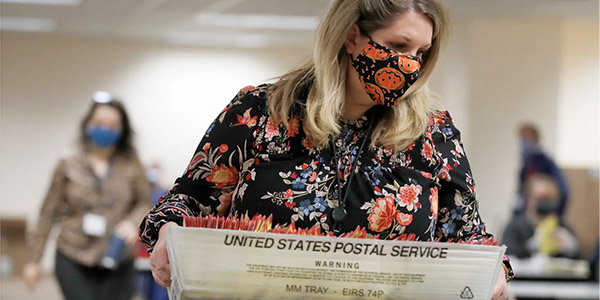
More Americans than ever before voted by mail in the 2020 general election, about 46 percent of all voters.
— via the MIT Election Data and Science Lab
WBUR
Mass. Dems want to make vote-by-mail permanent | Charles Stewart III cited
Stewart notes that there's no particular reason for Republicans to oppose vote-by-mail. "I like to remind people that before this election, absentee ballots were considered to be a Republican mode of voting," he said.
Story at WBUR
THE NEW YORK TIMES
Democrats splinter over strategy to push voting rights bill | Charles Stewart III cited
“I’ve been saying that no election administrators were harmed in the making of this bill,” quipped Charles Stewart III, a leading expert on elections. “Running elections is detail-intensive. You’re adding new features and adding complexity, not just shifting complexity from one place to another.”
Story at The New York Times
VOX
Republicans' efforts to restrict mail voting could backfire | MIT Election Lab data cited
More Americans than ever before voted by mail in the 2020 general election, about 46 percent of all voters, according to the MIT Election Data and Science Lab. A large motivator behind this was to avoid the in-person contact of voting lines and Election Day polling places.
Story at Vox
ECONOMICS
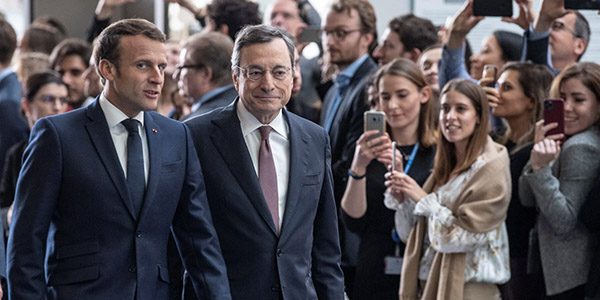
Credit: Pool photo by Boris Roessler
Mario Draghi (PhD '76, Economics) "is poised to fill a leadership vacuum in Europe. Increasingly, he seems to be speaking for all of Europe. 'The difference is that everybody, when Mario Draghi speaks, knows that he is not just pushing, boosting the Italian interest but rather the European Union’s.'" — The New York Times
THE NEW YORK TIMES
How Mario Draghi (PhD '76, Economics) is making Italy a power player in Europe
The new prime minister is leveraging his European relationships and his solid reputation to make Italy a force on the continent in a way it has not been in decades.
Story at the New York Times
PROJECT SYNDICATE
Growth is not enough | J-PAL
Following the steep economic downturns triggered by COVID-19, policymakers should be rethinking fundamental questions. None is more fundamental than whether rapid economic growth is the best way to drive development and help struggling communities escape poverty.
Story on the J-PAL website (for access)
THE FINANCIAL TIMES
The case for taxing the rich more | Peter Diamond and Emmanuel Saez '99 cited
The level at which marginal tax rates become an overall negative may be remarkably high. In 2012, two economists, Peter Diamond at MIT and Emmanuel Saez (MIT PhD '99) at Berkeley produced a paper arguing that the ideal top rate for society as a whole was 73 per cent.
Story at The Financial Times
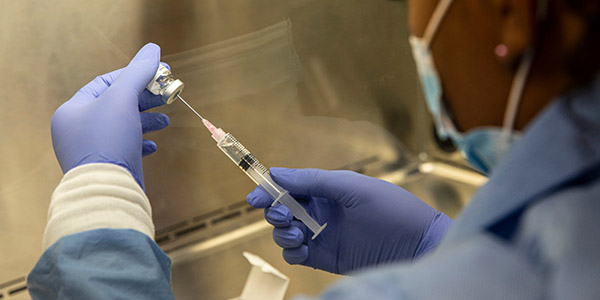
Drugs being prepared for Regeneron 69 research at a lab in Chandler, Arizona. Photo: Adriana Zehbrauskas, The New York Times
"Randomized, evidence-based trials, long required for new drugs, are now underway for government policy initiatives." — Amy Finkelstein, MIT Professor of Economics
THE NEW YORK TIMES
Bringing rigorous testing to health care policy | by Amy Finkelstein
"Now that the Biden administration is, again, properly emphasizing that all federal agencies need to make 'evidence-based decisions' based on the highest scientific standards, perhaps truly rigorous testing of social policy will become as commonplace as it is for new vaccines. That would help ensure that government services are delivered as effectively and efficiently as possible." Professor Finkelstein is also the co-director of J-PAL North America, a research center that conducts randomized evaluations.
Commentary at The New York Times
FINANCIAL TIMES
Increased spending has inescapable consequences | by Daniel Aronoff, PhD candidate
Aronoff writes "The fundamental issue is that an increase in spending implies a shift of resources to government (and thence to the venues chosen by government). Over the past two decades offshore investors, particularly from China, have lent their resources to the US government. That era may be drawing to a close."
Letter at The Financial Times
THE ATLANTIC
How mRNA technology could change the world | research by Jeffrey Harris cited
mRNA’s story likely will not end with COVID-19: Its potential stretches far beyond this pandemic. A new paper [by MIT professor emeritus of economics and practicing physician Jeffrey Harris] argues that repeated failures forced HIV-vaccine researchers to spend a lot of time and money on strange and unproven vaccine techniques—such as synthetic mRNA and the viral-vector technology that powers the Johnson & Johnson vaccine.
Story at The Atlantic | Harris research paper
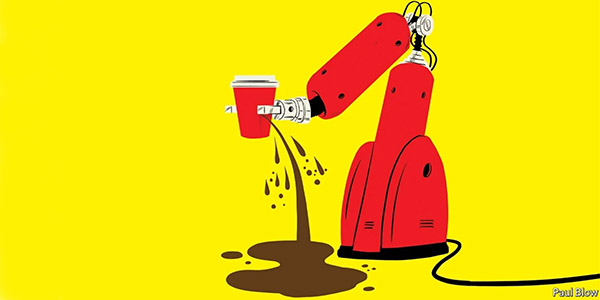
Illustration by Paul Blow, via The Economist
Jobs in coffeeshops may not pay much, but their demise would be a disaster. “One thing worse than too many low-paid jobs is too few low-paid jobs.” — David Autor, MIT Professor of Economics
THE ECONOMIST
Robots threaten jobs less than fearmongers claim | Autor and Acemoglu cited
Jobs in coffeeshops may not pay much, but their demise would be a disaster. “One thing worse than too many low-paid jobs is too few low-paid jobs,” said MIT economist David Autor. In recent congressional testimony, MIT economist Daron Acemoglu said that “There are now more reasons for employers to look for ways of substituting machines for workers and recent evidence suggests that they are already doing so.”
Story at The Economist
CNBC
Silicon Valley leaders think A.I. will fund free cash handouts. | Daron Acemoglu cited
Acemoglu told CNBC: “There is an incredible mistaken optimism of what AI is capable of doing.” Acemoglu said algorithms are good at performing some “very, very narrow tasks” and that they can sometimes help businesses to cut costs or improve a product.
Story at CNBC
CRITICAL RESPONSE
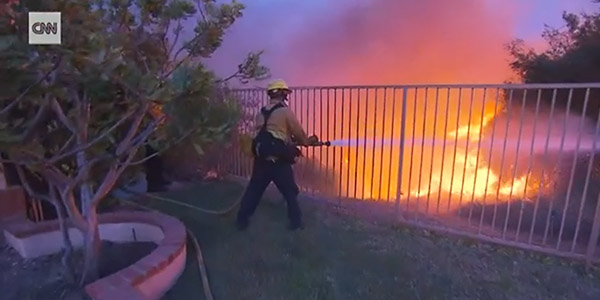
Wildfires in California, 2020; still image from CNN video
As people flee wildfires, rising seas, and more intense storms on the coasts, the midwestern city of Duluth, Minnesota is trying to become a safe haven for climate migrants. — via John Sutter, MIT KSJ Fellow
CNN
Climate migration: Is anywhere safe from the crisis? | by John Sutter, MIT KSJ Fellow
Sutter writes, "Without government programs to help people relocate out of harm's way (there are very few, and they're not scaled appropriately), climate migration will only widen gaping inequalities in this country. Some can choose to move. Others will be left to fend for themselves." .
Story + Video CNN
AMERICAN PUBLIC MEDIA
Author Beverly Cleary highlighted working class struggles | Marah Gubar cited
Gubar said Cleary had the ability to draw readers' attention to both the large, structural reasons that lead to economic inequality and “the day-to-day, quotidian difficulties of growing up poor.”
Commentary at American Public Media
THE NEW YORK TIMES
Valkyrae gets a big chair in the gaming world | T.L. Taylor cited
“When you look at the amount of barriers to participation women face, including outright harassment, you began to see that women are some of the most dedicated players out there,” said Taylor, an MIT Professor of Comparative Media Studies.
Story at The New York Times
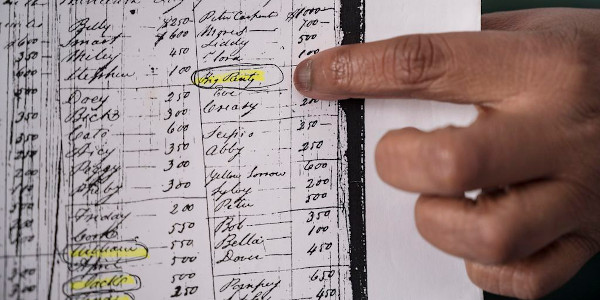
Tamara Lanier points out the name of an ancestor, on an inventory from 1834. Photo via the New York Times
THE BOSTON GLOBE
Harvard is studying its ties to slavery | MIT historian Craig Steven Wilder cited
Harvard is facing pressure to address questions raised by a group of daguerreotypes, the earliest known images of enslaved people in the U.S. Asked to comment, MIT historian Craig Steven Wilder, author of Ebony & Ivy: Race, Slavery, and the Troubled History of America’s Universities, said the daguerreotypes are a reminder that “the relationship between Harvard and slavery [like that of many other American universities] was more than financial. The very educational project itself benefited from slavery.” Wilder also leads a project at MIT that researches the Institute's relationship to the legacy of slavery.
Story at The Boston Globe
FAST COMPANY
In a world of screens, Sherry Turkle wants to make eye contact
Minds and selves and how they change have long been fascinations for Turkle. So this pandemic time, as awful and deadly and isolating as it is, is also interesting. It's also a time when the digital technology that she's studied for so long has become increasingly entwined with our minds and bodies—and just at the moment when we were asking some of the urgent questions that Turkle's been asking for years now.
Story at Fast Company
THE NEW YORKER
Sherry Turkle's plugged-in year
Technology has allowed some of us to work, learn, shop, and socialize from home, exchanging the rough, natural edges of life for the smooth glass of our screens. We've come to inhabit the world that Turkle has described for decades—a world in which technology is “the architect of our intimacies.”
Story at The New Yorker
THE NEW YORKER
Seeking the true story | translated by MIT historian Hiromu Nagahara
Nagahara, an MIT Professor of History, translated The New Yorker article into Japanese, expanding the audience for this response to a controversy among scholars and public audiences in Japan, Korea, and the U.S. over an article by a law professor denying the experiences of World War II-era "comfort women."
Story at The New Yorker
IN MEMORIAM
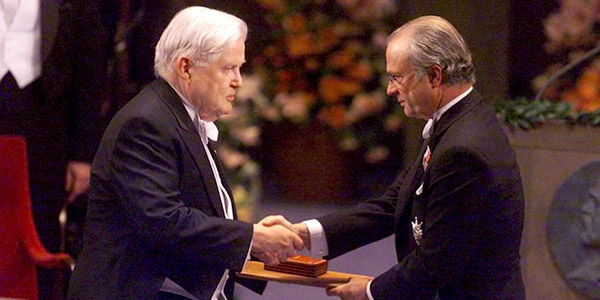
Robert A. Mundell, left, receives the Nobel Prize in economics in 1999. (Tobias Rostlund/Scanpix Sweden/AFP/Getty Images)
FORBES
The Zeus of economics
"Mundell was an impossible amalgam of theoretical genius, algebraic and especially geometrical lucidity, cultural sensibility, and unmeasurable practical influence. His articles in the journals in the 1950s and 1960s were Zeus-like, on a wholly different plane from any in the field. They were reprints of the chapters of his 1956 MIT dissertation."
Obituary at Forbes
THE NEW YORK TIMES
Robert Mundell, a father of the euro, dies at 88
Professor Mundell first studied economics and Slavonic studies at the University of British Columbia before winning a scholarship to the University of Washington. Wanting to continue his study with some of the best economists in the world, he headed to MIT to earn his PhD.
Obituary at The New York Times
THE WASHINGTON POST
Robert Mundell, Nobel-winning economist, dies at 88
Mundell was widely regarded as one of the most consequential economists of the late 20th century, his work often compared or even equated with that of John Maynard Keynes and Milton Friedman.
Obituary at The Washington Post
SECURITY STUDIES
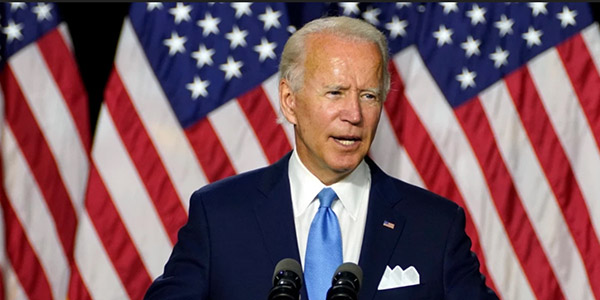
The Biden/Harris administration and Russia agreed to extend a nonproliferation treaty that restricts the two nations' arsenals of some of the deadliest weapons known to humankind. — via Jim Walsh, MIT Security Studies Program
NPR
What does the New START Treaty mean for the U.S. & Russia? | Jim Walsh
The Biden/Harris administration and Russia agreed to extend a nonproliferation treaty that restricts the two nations' arsenals of some of the deadliest weapons known to humankind.
Commentary at NPR | Text of the Treaty, US State Department
NPR
U.S. & China officials meet for first time since Biden took office | M. Taylor Fravel
"On the one hand, I might view it as positive because the U.S. is airing concerns that I, as the ally or partner, share. On the other hand, I might be concerned that this is the sign of a relationship that's going to sort of accelerate in terms of its decline."
Conversation at NPR
REUTERS
Reaction to North Korea ballistic missile launch | Vipin Narang
"It serves multiple purposes for North Korea: regular testing is still necessary as North Korea tries to improve its conventional and nuclear missile technology and operations, it is a proportionate response to joint ROK-U.S. exercises, and it serves as a reminder to the Biden administration that Kim is still there expanding and improving his nuclear and missile force," says Narang.
Story at Reuters
THE GUARDIAN
North Korea claims it tested a new guided missile | Vipin Narang
Narang said it appeared to be a weapon that the North displayed at a military parade in January. “A 2.5 ton warhead likely settles the question whether this KN23 variant is nuclear capable. It is."
Story at The Guardian
WBUR
New efforts underway to revive the Iran Nuclear Deal | Jim Walsh
Walsh speaks to Here & Now's Peter O'Dowd about efforts to bring the U.S. back into the Iran nuclear deal.
Conversation at WBUR
PANDEMIC-RELATED MEDIA
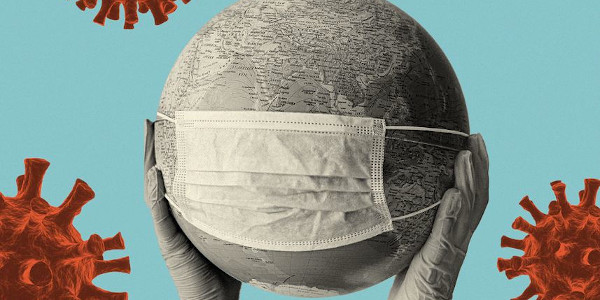
Unsplash by Anna Shvets; graphic via NBC
"All three authorized vaccines in the United States offer recipients robust protection against illness, particularly the worst cases." A major question remains: "How good are they at blocking transmission to other people?"
— Carolyn Johnson, M.S. MIT Science Writing, '04
At-A-Glance List of Pandemic-related Media Publications from MIT SHASS
An ongoing list of commentaries from our School community to inform policy and to increase public understanding of the pandemic.
THE WASHINGTON POST
Study will help determine when it’s safe to take masks off | by Carolyn Johnson '04
Johnson, M.S. Science Writing '04, writes that "All three authorized vaccines in the United States offer recipients robust protection against illness, particularly the worst cases. But how good are they at blocking transmission to other people?"
Story at The Washington Post
NPR
How messaging on Covid-19 disparities affects policy preferences | by Evan Lieberman
Lieberman, a professor of economics at MIT, discusses his study examining how the pandemic’s racial disparities have affected people’s public policy views. The bad news he says, is that when White people who had expressed more negative feelings toward Blacks, learned there were racial disparities in Covid-19 cases, they saw less risk to themselves, and were more hostile toward efforts to contain the pandemic. Lieberman reflects that “I think it’s important for us to keep reminding one another how interconnected we are, how our shared fate exists together depending on the actions we take and don’t take.”
Story via NPR
THE GUARDIAN
"The pandemic has shown us that people need relationships" | Sherry Turkle
Turkle was one of the first academics to examine the impact of technology on human psychology and society. She has published a series of acclaimed books: her latest, The Empathy Diaries, is an enthralling memoir taking in her time growing up in Brooklyn, her thorny family background, studying in Paris and at Harvard, and her academic career.
Story at The Guardian
THE NEW YORK TIMES
How to nudge people into getting tested for the coronavirus | by Emily Anthes '06
Anthes, M.S. Science Writing '06, writes, "Although coronavirus screening is new, researchers in several fields — including behavioral economics, implementation science and health psychology — have spent years studying how to encourage people to engage in other kinds of health-related behaviors, including cancer screening, H.I.V. testing and vaccination."
Story at The New York Times
THE NEW YORK TIMES
Fatigue as France enters yet another lockdown | Antoine Levy cited
Levy, a doctoral candidate in economics, said that France had invested heavily in enforcing its lockdowns, putting millions of workers on paid furloughs and gradually tightening restrictions on people's movements, but very little in developing vaccines. “There has been very little investment in what seems to be the only way out of the crisis, while accepting huge sacrifices in terms of public freedom and in the economy for a year,” he said.
Story at The New York Times
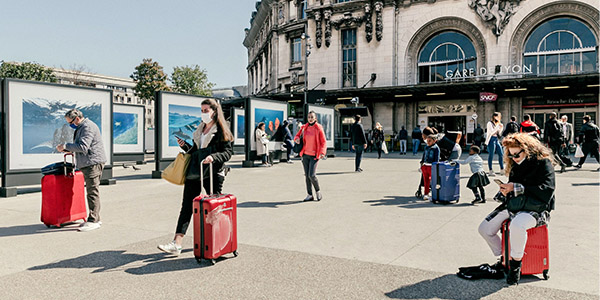
Outside the Gare de Lyon train station in Paris. Photo, Andrea Mantovani for The New York Times
The Media + Awards Digest is a section
of Said and Done, the School's online digest.
EXPLORE
Follow MIT Now
for updates on our community's path back to campus
Subscribe to Said and Done
10 issues a year
Making a Better World | Impact
Browse
Making a Just Society
Explore the Resources
Solving Climate
Browse the Commentaries | MIT Climate Portal
Ethics, Computing, and AI
Full Series
Computing and AI | Humanistic Perspectives
Full Series
Perspectives for the Pandemic
Explore the Series
SHASS on MIT News
Research and Features
MIT Campaign for a Better World
Story | Join Us
Published by SHASS Communications
Office of the Dean, MIT School of Humanities, Arts, and Social Sciences
Editor and Designer: Emily Hiestand
Publication Associate: Alison Lanier
Media Relations Manager: Stephen Oakes
Published 22 April 2021




